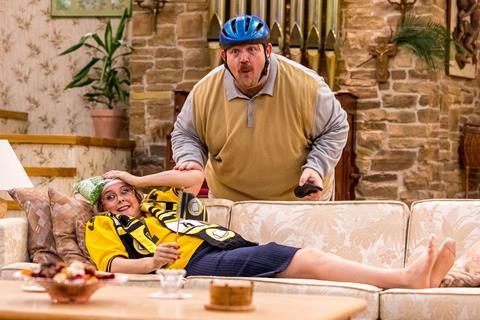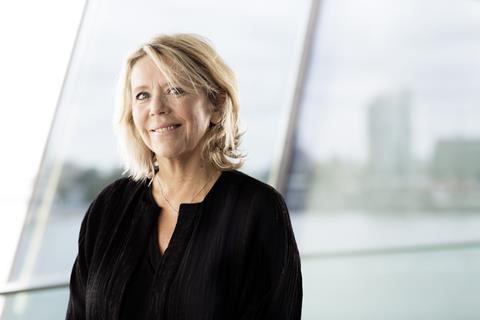
When London-based consultancy Olsberg SPI published a study into why Dutch films were failing to perform to their fullest potential, one area highlighted was the under representation of Dutch titles at the major international festivals.
At this year’s International Film Festival Rotterdam (IFFR), Sandra Den Hamer, interim CEO Netherlands Film Fund, spoke to Screen and emphasised her determination to put the country’s cinema back in the international shop window.
“We would very much like to see our Dutch films more visible than they are,” she said.
That means stronger marketing and strengthening the ties with See NL, the organisation that markets and promotes Dutch films international. It is now headed by Nathalie Mierop, taking over from Ido Abram.
Den Hamer would like to bolster the profile of the Holland Film Meeting, which takes place during the Netherlands Film festival in Utrecht in September. It is one event at which international financiers, distributors and sales agents are exposed to the best in Dutch cinema - and could in theory work as a Dutch equivalent to Unifrance’s Rendez-Vous With French Cinema, the long established market and press junket for French films held in Paris every January.
“Due to the pandemic and to budget reasons, there was not enough money to invite as many guests as all of us wanted,” says Den Hamer of the past few editions. “That’s one of the priorities for the future, to strengthen the international visibility of our films.”
There is already evidence Dutch films are beginning again to catch the eye of festival selectors. At IFFR, Steffen Haars and Flip van der Kuil’s raucous and blood-filled satire Krazy House, starring Nick Frost and Alicia Silverstone, is making its European debut after a world premiere in Sundance.
Next month, Mascha Halberstadt’s animated Fox And Hare Save The Forest, her follow up to local success Oink, is premiering in the Berlinale. Urban Sales is handling the title internationally.
The Dutch industry is still looking for a big break out director whose work will regularly be picked in the main competitions at A-list festivals but Den Hamer is encouraged by the potential of the filmmakers old and new with projects in the pipeline.

“There is lots of talent in all categories working in the Netherlands,” she says. ”I am optimistic about the Dutch talent and the Dutch films coming up.”
She points to a range of names. Mike Van Diem, the Oscar-winning director of 1997’s Character , is working on a buzzy drama called Voor Onze Meisjes through production outfit Keplerfilm. Martin Koolhoven is in development on Emerald Butterfly, which will be produced by the redoubtable Els Vandevorst through N279 Entertainment; the Netherlands’ most provocative documentary maker Renzo Martens, who has continually exposed the dark side of the colonial legacy, is back with a new film, The Dawn Of The Post-Plantation.
Sacha Polak, whose second film Silver Haze is about to be released in the UK by BFI Distribution, is also at the early stages of a new project with the Fund.
Projects further down the line include David Verbeek’s The Wolf, the Fox And The Leopard, produced by Lemming Films, which is expected to launch at a major festival this year and may even be ready for Cannes. Morgan Knibbe, acclaimed for his documentary work, is completing his debut fiction film, the Philippines-set The Garden Of Earthly Delights, produced by Baldr Film. Mees Peijnenburg, director of Paradise Drifters, recently received production support for his new movie Volcano.
And in an interesting move, rising auteur Ena Sendijarevic, whose second feature Sweet Dreams was the Netherlands’ Oscar contender this year, is now looking to produce her own films.
At home, the local market share for Dutch films fell 2% from 16% in 2022 to 14% last year. Like other European territories, overall, the Netherlands is seeing audiences return to cinemas after the pandemic downturn. According to distributors’ organisation (FDN), admissions reached approximately 32 million in 2023, 27% up on 2022. Barbenheimer worked its magic in Dutch cinemas as it did elsewhere while international arthouse favouries including Triangle Of Sadness, Anatomy Of A Fall and Aftersun all did strong business in Dutch arthouses.
Rotterdam spotlight
IFFR itself remains a crucial international platform for supporting Dutch talent. As ever, the festival this week has the premieres of several intriguing Dutch movies. Vincent Boy Kars’ hybrid drama-doc, Future Me, is screening in Harbour. Stefanie Kolk’s debut feature Melk (sold by Bendita Film Sales) is also berthed in Harbour having premiered in Venice and played in competition in Zurich; Chris Teerink’s documentary meditation on TS Eliot’s The Waste Land is in Harbour too.
The Bright Future strand sees the world premiere of Astrid van Nimwegen’s charming new feature doc, A Few Mornings And Evening, about life on a small Czech farm, and the premiere of Guido Coppis’s darkly humorous debut feature Bijt.
Plenty of emerging talent is showcased in the short sections too. For example, Loïs Dols de Jong, who acted as a child in Jeroen Krabbé’s The Discovery Of Heaven in 2001, is presenting her filmmaking debut, short thriller NL-Alert, in Harbour. This is about a young mother struggling to get home to her baby who discovers Amsterdam is under nuclear attack.
Cultural funding threat
Storm clouds may lurk ahead for the entire cultural sector, including film. No-one yet knows yet just what effect right- wing election winner Geert Wilders will have on the arts - if and when he finally manages to form a government.
“There are proposals for cuts in the budgets of art institutions and cultural funds,” says Den Hamer who underlines nothing has been confirmed or announced yet. “I also expect more focus on the regions and the wish to invest more in local stories and local talent, which is a good thing.”
There is obvious trepidation about how the negotiations will unfold. Next week, the Fund is presenting its new four- year financial plan for 2025-2028. The previous government has already approved a budget for the sector but it remains to be seen whether its successor will honour the spending plans.
“Making films is expensive and without public financing, productions, just like in other countries, cannot be made., says Den Hamer. “At this point in time we just don’t know [what will happen] and it shouldn’t keep us from moving forward and continue our important work ”
That work includes investing more in fewer films.
“We really want to raise the quality of the Dutch film and to raise the artistic freedom for the filmmakers,” Den Hamer affirms.
The aim now is to give directors ‘more artistic freedom, time and space in the development stage” “less regulations and rules” and also bigger budgets, both for script development as well as for production. One change is that writers and directors looking for script development finance will take part in pitch panels during which they will present new projects at an early stage to industry experts.
“We’ve increased the budget for development. We’ve increased the budget for production and we propose more changes such a putting more emphasis on the public and on the lifecycle of a film, not only on making films,” Den Hamer explains. “Those priorities and the four -year plan is not a plan that we’ve been writing in an ivory tower. It’s the result of many conversations with the industry. This is the outcome of a process, reflecting all the meetings we have had with the film sector.”
Den Hamer is a former IFFR director and head of Eye Film. She took the reins at the Fund last May after Bero Beyer stepped down for health reasons. She expects to stay in the job until later this year. Her successor should be in place for the new 2025-2028 cycle
“Later this year, we’ll start to look for a new director [of the Fund],” Den Hamer says. “I am the ‘in between’ director…I am very happy to be here for this period of transition but then, at a certain point, there has to be a new director, a new generation who will be here for the next 10 years.”

























No comments yet